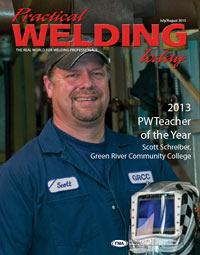- FMA
- The Fabricator
- FABTECH
- Canadian Metalworking
Categories
- Additive Manufacturing
- Aluminum Welding
- Arc Welding
- Assembly and Joining
- Automation and Robotics
- Bending and Forming
- Consumables
- Cutting and Weld Prep
- Electric Vehicles
- En Español
- Finishing
- Hydroforming
- Laser Cutting
- Laser Welding
- Machining
- Manufacturing Software
- Materials Handling
- Metals/Materials
- Oxyfuel Cutting
- Plasma Cutting
- Power Tools
- Punching and Other Holemaking
- Roll Forming
- Safety
- Sawing
- Shearing
- Shop Management
- Testing and Measuring
- Tube and Pipe Fabrication
- Tube and Pipe Production
- Waterjet Cutting
Industry Directory
Webcasts
Podcasts
FAB 40
Advertise
Subscribe
Account Login
Search
Accepting the torch, carrying a legacy
Welding, people, and a commitment to the trades fuel 2013 PWTeacher of the Year’s success
- By Amanda Carlson
- July 12, 2013
- Article
- Arc Welding
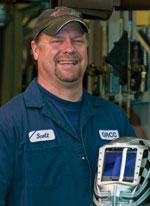
Scott Schreiber left his job doing weld repair to take over as welding instructor at Green River Community College for his mentor. He hasn’t looked back since. Photos courtesy of Bruce Ikenberry Photography, Lacey, Wash.
As Scott Schreiber sat in his office—nicknamed the fishbowl for its four walls of windows that open up to every angle of the shop—and reflected on his relatively short 12-year teaching career at Green River Community College in Auburn, Wash., he was almost constantly interrupted by students who either needed keys to a storage closet, had questions, wanted to share a joke or an observation, or just wanted a chance to hear what their teacher had to say for himself.
“Yeah, you’d better put that back,” he said to a student returning a tool to its proper place. Almost always these students, who range in age from early 20s to early 50s, were met with a fatherly, or in some cases brotherly, ribbing that was friendly, not biting. The positive dynamic, the energy, and the comradery between the four walls of the Green River welding lab are palpable.
Schreiber, the 2013 PWTeacher of the Year, took over a welding program that was good to begin with and made it better. For the last 12 years he has surrounded himself with a loyal and passionate staff to help him expand an already good program built by his mentor into a bigger, more modern version.
Schreiber demands excellence, continuous improvement, and is always in search of creative and meaningful learning opportunities for his students. He is committed to the welding trade and asserts ownership over a program that has meant so much to him throughout his entire adult life. But most impressive is his ability to connect with each of his students in the way that they require to be successful. They aren’t just bodies taking up space—they are people with goals, problems, strengths, weaknesses, and personalities. Each individual is an integral part of something bigger than themselves and even bigger than Schreiber.
Making a Good Program Better
Schreiber always knew he wanted to be a welding instructor, he just didn’t know when or where the opportunity would present itself. He finally got the call after spending 17 years as a heavy equipment repair welder for an excavating company in eastern Oregon.
It was 2001 and longtime Green River welding instructor and Schreiber’s former teacher-turned-mentor, Al Croppi, was experiencing health issues that threatened to force him into retirement. Croppi called his protégé and offered him the opportunity to take over the welding program. Despite the fact that his family was in Oregon and that he’d be taking a significant pay cut, Schreiber accepted the position in his hometown, not wanting to see the program that he cared deeply for fall into the wrong hands.
Immediately Schreiber realized he was taking over a well-cared-for program with immense growth potential.
“When I got there, we had 18 students in a class that ran from 8 a.m. to noon, five days a week. Just one class. The shop was shut down until the 5:30 p.m. to 10 p.m. class that ran four nights a week. That class also had 18 students. That was it. The lab was shut down more than it was open,” Schreiber explained.
He envisioned growing the program to the point where it was pushing through as many welders as it could handle in an efficient manner. And growth did take place, gradually, with the addition of a three-credit class from noon to 1 p.m. every weekday to fulfill the basic welding requirements of degree-track students not necessarily heading toward a career in welding.
Things picked up in 2008 when the economy took a nosedive, resulting in mass layoffs in the region. Enrollment in the welding program exploded to the point that it developed a wait list upward of 100 people.
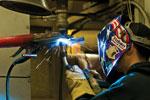
Cameron Nelson practices his overhead GMAW technique. Approximately 80 to 85 percent of Green River welding students find employment with local fab shops or are placed with local unions after graduation.
“That triggered the idea to start up an afternoon session. We had the space and the facility to do it, and with that time slot from 1 p.m. to 5 p.m. free, it was the perfect scenario to start another full-time, 13-credit section.”
Schreiber brought onboard a former boss, Ed Vesser, to teach the afternoon session. Not long after implementing the afternoon session, the program again developed a wait list, so he hired Casper Fox, a former student, to lead weekend classes on Friday nights, Saturdays, and Sundays.
Today, even with all four sessions at or slightly over capacity, they still aren’t able to keep up with demand. Approximately 115 people are on the wait list. Plans for a new building to house welding, automotive, auto body, carpentry, and manufacturing classes—approval is due this summer—would allow the program to double in size.
The ever-expanding welding program is just one clue that Schreiber and his staff have built a solid program that gives people a skill. Approximately 80 to 85 percent of students are hired by unions or fabrication shops. Much of that is due to the program’s reputation for developing strong, independent, competent, and responsible welders. And that sentiment is echoed by local industry representatives like Rene Johnsen, training coordinator for Helac Corp., a fabricator of hydraulic helical rotary actuators. Johnsen, a Green River welding program graduate who now sits on its advisory committee, calls Schreiber first when she needs to fill a slot.
“Eighty percent of our welding crew came from Green River. For the most part, we end up hiring and keeping a majority of the people Scott sends us. They’ve showed consistency and pride in their work, and we see that immediately. I know a lot of that comes from Scott,” Johnsen asserted.
Schreiber’s philosophy is very simple: Come to class, be on time, we’ll do the rest. Meaning, students who are committed, serious, and open-minded will succeed. In fact, half of a person’s grade is based on attendance and his or her ability to show up on time.
“Their grade is something for them to lose. Even though I still have to be critical of their assignment and tell them what’s wrong, it always ends on a positive note. I think they respect that. I wouldn’t ask them to do anything that I’m not willing to do.”
Schreiber also knows the value of the struggle. To become free-thinking, accountable, and confident welders, they have to learn how to problem-solve and communicate. He encourages the welders to help each other figure things out through group think.
“We’ve found that as we pull away from them as instructors and let them struggle a little so that they have to start to think, they start to work together as a group, comparing notes. Then we can go back in and talk to these guys about what they’re doing, and they get the concepts that much quicker.
“If they can problem-solve, they can be successful,” Schreiber added.
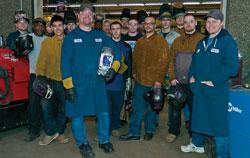
Schreiber and weekend instructor Casper Fox (far right) pose with the welding students in the morning session. The program runs morning, afternoon, and evening sessions Monday through Friday and weekend sessions Friday night through Sunday.
Learning Through Service
You can tell a lot about a leader by his or her ability to serve others. One project in particular involved assisting the city of Auburn in curbing rampant copper wire theft from city street light junction boxes. David Ornsby, street and vegetation manager for the city of Auburn, said in one year these thefts have cost the city about $170,000 in labor and material. After considering their options, Ornsby inquired about the welding program at Green River. After a few phone calls he and Schreiber met with other city personnel to hatch a plan to put the students to work welding shut the street light boxes that contained the copper wire. The plan meant valuable work experience for students and an economical fix to the problem for the city. Schreiber was thrilled.
“I couldn’t get back to the college quick enough to tell my dean. I wasn’t going to ask … I just told him what we were going to do. Sometimes that gets me in trouble, but if you wait and go through the process, you risk losing it. There’s not enough time for all of that,” Schreiber explained.
He, Vesser, and Fox assembled the students, put them through a step-by-step training session, and got city employees up to speed on safety considerations. City trucks were outfitted with a gas-driven welding power source, and student welders were paired with city employees. Fifteen business days later, the Green River welding students successfully sealed 1,833 boxes. Ornsby was amazed.
“Once they started figuring out a rhythm and how they were going to go about it, it went very smoothly. Of course, like with any project, the start was a little slow, just getting the details worked out, but once it started rolling, it went incredibly smooth. I told Scott that if any other cities approached him to send them my way, because I will tell them all about the program and I would definitely recommend his students again,” Ornsby said.
The students’ efforts garnered the attention of local media outlets and was the source of praise from Dr. Eileen Ely, president of Green River, who said the initiative was above and beyond anything she’s ever witnessed in any professional technical program.
“The project had nothing to do with me, nothing to do with the dean; it was all the instructor’s efforts of going out and taking the extra step on behalf of students. To me, he really is a master teacher,” Ely said.
And it gave students like 20-year-old Devin Wheeler an opportunity to get real-world experience outside of the typical controlled classroom setting.
“We were outdoors where there was water, wind, and people around. Being able to weld on rust, galvanized, paint, there were actually some boxes that I welded that were submerged in water and all I could do was push as much of it away as I could with my hand. It was a lot different. I knew how to do it right, but with those other factors, it definitely changes things and requires a whole new set of skills,” Wheeler said.
Championing the Trades
Schreiber’s service extends to other technology programs beyond his own. He feels that it is his responsibility as a Green River employee to make sure the college as a whole continues to adapt and grow to meet industry demands. Many of those industry demands revolve around aerospace, thanks to Boeing plants in nearby Renton and Everett and their 330 supplier companies.
But over the last several years, explained Josh Clearman, dean of instruction: career and technical education at Green River, Boeing’s workforce has aged. The company expressed a desire for area colleges to offer short-term certificate programs (lasting roughly two quarters, or six months’ time) based on specific knowledge, skills, and abilities (KSAs) that it needed entry-level applicants to possess. In particular, Boeing was looking for workers with skills training in precision machining, quality assurance, and machine maintenance.
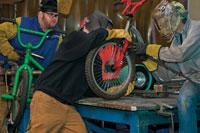
Devin Wheeler (center) and two classmates perform a repair on a drift trike. Schreiber bases half of their grade on attendance and punctuality in an effort to hammer home the soft skills.
“The Puget Sound area is the fourth-largest manufacturing sector in the country. Our fortunes aren’t tied to Boeing, but it is important that they be able to get what they need from the workforce here. The fear was if we couldn’t provide a good workforce, Boeing would go somewhere else. It mobilized the colleges, the government, and businesses into action,” Clearman explained.
Even though the short-term certification was not welding-related, Schreiber got involved anyway. Why?
“I have an obligation to industry as an instructor to provide qualified personnel to fill the slots that are in high demand and that are being left vacant by retirement. It’s my way of giving back. We have a pretty good reputation at the college of providing qualified personnel, and it’s not just in my class; it’s in all of the classes. We want to maintain that level of excellence so that industry and local shops we deal with, when they need someone, we’re the go-to source,” Schreiber said.
He and several other college representatives met with Boeing and its suppliers; he then helped write a grant, secured the instructors, and assisted in writing the curriculum.
The result was the creation and implementation of an aerospace manufacturing program at Green River in 2012 and three brand-new short-term certificate programs in 12 other colleges across the state, and in record time.
“They went from an idea to classes in 100 days. At a college, that’s light speed,” Clearman added.
That sense of obligation has led to 108 people walking away from Green River with a short-term certificate, employable skills, and subsequently jobs within aerospace manufacturing.
“He’s got a great pulse on all parts of metal fabrication. I don’t encounter people too often with such a broad knowledge base who are enthusiastic, who are giving freely of their time. It’s hard to see anything that he’s not helping or being successful with,” Clearman said.
Forward Progress
Schreiber has a reputation among his students and colleagues as having unparalleled welding skills. He’ll be the first to admit that his welding ability is a product of repetition and a tenacious drive to one-up himself, no matter how good the weld looks or how structurally sound it is. It should be no surprise that he applies the same approach to his welding program. No matter how well things are going or how much the program is growing, he’s never satisfied, and he never wishes to remain stagnant.
Even though Schreiber is proud that his program is in such high demand, the fact that it is currently running at 112 percent capacity with 115 people on the wait list is a challenge in terms of recruiting. After all, how do you convince someone that a two-year wait is worth it?
Maybe the actions and direction set forth by its leader are the reasons.
In Their Words
Students, industry peers, and colleagues share their thoughts and perceptions about Scott Schreiber as a friend, mentor, and instructor.
“It’s obvious that his program means a lot, if not everything, to him. The success of it comes first for him, and when I say that I mean the students and their success.” — David Ornsby, street and vegetation manager, city of Auburn
“At a community college we see a lot of people just starting out or pressing the reset button. It takes a special type of person to shepherd them through learning a valuable skill and at the same time getting them through the program. He also ensures that the graduates are of the utmost quality, so that when someone calls Green River and wants to talk about welding, they know the candidates coming out of the program are going to be outstanding employees.” — Josh Clearman, dean of instruction: trades and technology divisions
“Scott’s a funny guy. He’s always there to help, but he’s not afraid to give you lip if you’re slacking. He’ll make sure to let you know that you’re wrong and tell you how you need to fix it. He’s just an awesome guy.”
— Devin Wheeler, 20, welding student
“He’s tied to industry and is very conscientious to the needs of industry. Since I first met Scott two years ago, I’ve seen things that tell me he’s going above and beyond for the school and for his students.” — Tim Honn, technical sales representative, Lincoln Electric Co.
“I will never be able to touch his welding skill. I guess that’s why he’s got the big office.” — Steve Harrison, 53, welding student, Green River welding lab aide
“I couldn’t be prouder. He’s done it all on his own and he makes Green River shine in his own way. The reputation of the welding department really isn’t falling on administration’s roles, it really is shining because of Scott and the other instructors who are working over there.” — Eileen Ely, president, Green River
“It’s like welding is his second nature or an extension of who he is. We are lucky to have him because he pretty much knows everything about getting us to understand the process.” — Brian McCorkle, 47, welding student
About the Author

Amanda Carlson
2135 Point Blvd
Elgin, IL 60123
815-227-8260
Amanda Carlson was named as the editor for The WELDER in January 2017. She is responsible for coordinating and writing or editing all of the magazine’s editorial content. Before joining The WELDER, Amanda was a news editor for two years, coordinating and editing all product and industry news items for several publications and thefabricator.com.
About the Publication
subscribe now
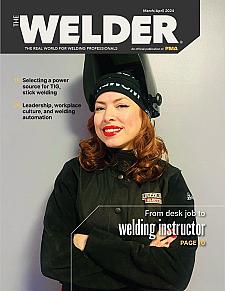
The Welder, formerly known as Practical Welding Today, is a showcase of the real people who make the products we use and work with every day. This magazine has served the welding community in North America well for more than 20 years.
start your free subscription- Stay connected from anywhere

Easily access valuable industry resources now with full access to the digital edition of The Fabricator.

Easily access valuable industry resources now with full access to the digital edition of The Welder.

Easily access valuable industry resources now with full access to the digital edition of The Tube and Pipe Journal.
- Podcasting
- Podcast:
- The Fabricator Podcast
- Published:
- 04/16/2024
- Running Time:
- 63:29
In this episode of The Fabricator Podcast, Caleb Chamberlain, co-founder and CEO of OSH Cut, discusses his company’s...
- Trending Articles
Sheffield Forgemasters makes global leap in welding technology
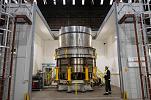
Welding student from Utah to represent the U.S. at WorldSkills 2024

Lincoln Electric announces executive appointments

Lincoln Electric acquires RedViking
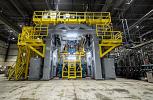
Engine-driven welding machines include integrated air compressors

- Industry Events
16th Annual Safety Conference
- April 30 - May 1, 2024
- Elgin,
Pipe and Tube Conference
- May 21 - 22, 2024
- Omaha, NE
World-Class Roll Forming Workshop
- June 5 - 6, 2024
- Louisville, KY
Advanced Laser Application Workshop
- June 25 - 27, 2024
- Novi, MI
























